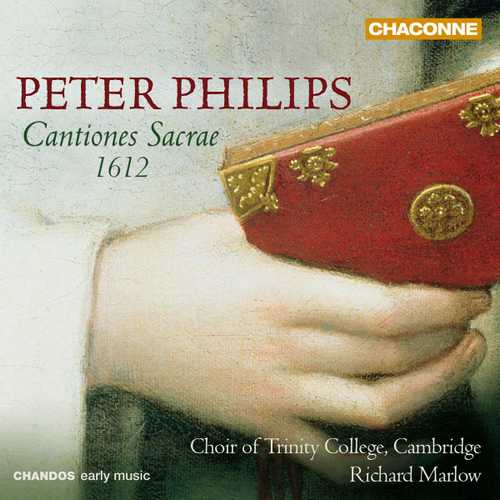
Composer: Peter Philips
Performer: Choir of Trinity College Cambridge
Conductor: Richard Marlow
Format: FLAC (tracks)
Label: Chandos
Catalogue: CHAN0770
Release: 2010
Size: 307 MB
Recovery: +3%
Scan: yes
Cantiones sacrae, pro praecipuis festis totius anni et communi sanctorum Vol. 1
01. No. 1. O beatum et sacrosanctum diem (In Festo Nativitatis Domini)
02. No. 4. Cantabant Sancti (In Festo SS. Innocentium)
03. No. 5. Gaudeamus omnes (In Festo S. Thomae Martyris)
04. No. 6. O nomen Jesu (In Festo Circumcisionis Domini)
05. No. 7. Modo veniet Dominator (In Festo Circumcisionis Domini)
06. No. 9. Tu es vas electionis (In Festo Conversionis S. Pauli)
07. No. 11. Hodie beata Virgo Maria (In Festo Purificationis B. Mariae)
08. No. 16. Christus resurgens (In Festo Resurrectionis Domini)
09. No. 17. Surgens Jesus (In Festo Resurrectionis Domini)
10. No. 18. Gentes Philippus ducit (In Festo SS. Philippi et Jacobi)
11. No. 20. Ascendit Deus (In Festo Ascensionis Domini)
12. No. 24. Ave verum Corpus (In Festo Corporis Christi)
13. No. 28. Gabriel Angelus (In Festo Joannis Baptistae)
14. No. 32. Ave gratia plena (In Festo S. Annae)
15. No. 33. Surge Petre (In Festo S. Petri ad Vincula)
Cantiones sacrae, pro praecipuis festis totius anni et communi sanctorum Vol. 2
16. No. 38. Cum jucunditate (In Festo Nativitatis B. Mariae)
17. No. 39. Factum est silentium (In Festo S. Michaelis)
18. No. 41. Sancti mei (In Festo Omnium Sanctorum)
19. No. 42. O beatum Martinum (In Festo S. Martini)
20. No. 44. Cantantibus organis (In Festo S. Caeciliae)
21. No. 48. Tristitia vestra (Tempore Paschali)
22. No. 50. Gaudent in caelis (In Natalis plurimorum Martyrum)
23. No. 56. Ave Regina caelorum (Antiphona B. Mariae)
24. No. 58. Salve, Regina (Antiphona B. Mariae)
25. No. 68. Ne reminiscaris, Domine
Peter Philips was, after William Byrd, the most published English composer of the Elizabethan-Jacobean Age. He was also, in his day, the best-known English composer on the European mainland but his absence from his homeland after the age of about twenty-one means that he remains relatively neglected at home. Born in 1560 or 1561, he trained as a choirboy at St Paul’s Cathedral in London and may have studied keyboard playing with Byrd. In 1582 he fled England to avoid persecution as a Roman Catholic, making his way to Rome. In 1585 he joined the entourage of another Roman Catholic refugee, Sir Thomas Paget, travelling with him through Northern Europe for the next five years, eventually settling in Antwerp in 1591. In 1593 he was accused of plotting against Elizabeth I and arrested, but was eventually exonerated. He joined the court chapel of Archduke Albert, Viceroy of The Netherlands, as organist in 1597 and remained there until his death in 1628.
The three years spent in Rome were crucial for the formation of Philips’s musical style. The early 1580s were years of rapid development in that city’s music, particularly in writing for multiple choirs. Philips wrote some double-choir music and the antiphonal principle underlies much of the music on this recording, even if written for a single choir of five voices: two sopranos, alto, tenor and bass – a texture that gives an overall brightness, often heightened by close spacing between the two sopranos.
Richard Marlow conducts the mixed Choir of Trinity College, Cambridge. About a previous release International Record Review wrote: ‘This is a triumph for Marlow and his Trinity college choir, for Chandos, and above all, for Mendelssohn’s reputation as an inventive and deeply rewarding composer of sacred choral pieces.’